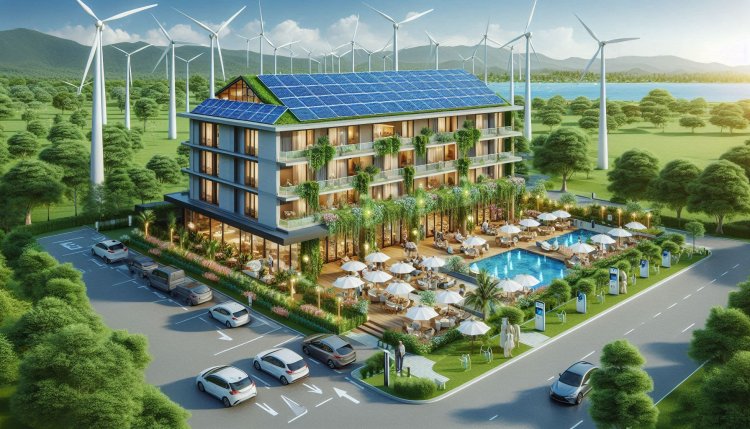Renewable Energy in the Hospitality Industry
Explore how the hospitality industry is embracing renewable energy to reduce carbon footprint and increase sustainability.

Renewable Energy in the Hospitality Industry
The hospitality industry has been increasingly embracing renewable energy solutions to reduce their environmental impact and operating costs. By investing in renewable energy sources, hotels, resorts, and other hospitality businesses can not only decrease their carbon footprint but also attract environmentally-conscious customers. Let's explore the various ways in which the hospitality industry is incorporating renewable energy into its operations.
Solar Power
Solar power is one of the most popular renewable energy sources being adopted by the hospitality industry. Hotels and resorts have been installing solar panels on their rooftops to generate electricity from sunlight. This clean energy source helps them reduce their reliance on the grid and lower their electricity bills. Some establishments have even gone a step further by integrating solar panels into their architectural design, creating aesthetically pleasing solar structures that also serve a functional purpose.
Wind Power
Wind power is another renewable energy option that is gaining traction in the hospitality sector. Wind turbines can be installed on hotel properties to harness the power of the wind and convert it into electricity. While wind power may not be as common as solar power in the hospitality industry, it is still a viable option for hotels and resorts located in windy regions. By investing in wind power, hospitality businesses can further diversify their renewable energy portfolio and become less dependent on traditional energy sources.
Geothermal Energy
Geothermal energy is a sustainable heating and cooling solution that is being utilized by some forward-thinking hotels and resorts. By tapping into the earth's natural heat, geothermal systems can provide efficient heating and cooling for buildings, swimming pools, and other amenities. This renewable energy source is not only environmentally friendly but also cost-effective in the long run. Hotels that invest in geothermal energy systems can benefit from reduced energy costs and increased energy efficiency.
Bioenergy
Bioenergy involves using organic materials such as biomass, biofuels, and biogas to generate heat and electricity. Some hotels and resorts are incorporating bioenergy systems into their operations to reduce their carbon footprint and promote sustainability. For example, biomass boilers can be used to burn wood pellets or agricultural waste to produce heat for heating water or space. By embracing bioenergy solutions, hospitality businesses can contribute to the circular economy and reduce their reliance on fossil fuels.
Hydropower
Hydropower is another renewable energy source that can be harnessed by hotels and resorts located near water bodies. By installing micro-hydro systems or small-scale turbines, hospitality businesses can generate clean electricity from flowing water. Hydropower is a reliable and constant source of renewable energy that can help hotels reduce their electricity costs and minimize their environmental impact. Some establishments are even incorporating water-saving technologies to further enhance their hydropower initiatives.
Benefits of Renewable Energy in the Hospitality Industry
There are numerous benefits to incorporating renewable energy solutions into the operations of hotels and resorts:
- Cost Savings: By generating their own clean energy, hospitality businesses can reduce their electricity bills and operational costs in the long term.
- Environmental Impact: Renewable energy sources produce fewer greenhouse gas emissions and help hotels and resorts reduce their carbon footprint.
- Marketability: Guests are increasingly looking for eco-friendly accommodation options, and hotels that invest in renewable energy can attract environmentally-conscious customers.
- Resilience: By diversifying their energy sources, hotels and resorts can become more resilient to fluctuations in energy prices and supply chain disruptions.
- Regulatory Compliance: Embracing renewable energy can help hospitality businesses comply with environmental regulations and demonstrate their commitment to sustainability.
Challenges of Implementing Renewable Energy in the Hospitality Industry
While the benefits of renewable energy are clear, there are also challenges that hotels and resorts may face when transitioning to clean energy sources:
- Upfront Costs: The initial investment required to install renewable energy systems can be high, which may deter some hospitality businesses from making the switch.
- Technical Expertise: Implementing renewable energy solutions may require specialized knowledge and expertise that is not readily available within the hospitality industry.
- Intermittency: Some renewable energy sources, such as solar and wind power, are intermittent and may not provide a constant source of energy, requiring backup systems or energy storage solutions.
- Regulatory Hurdles: In some regions, there may be
What's Your Reaction?

















